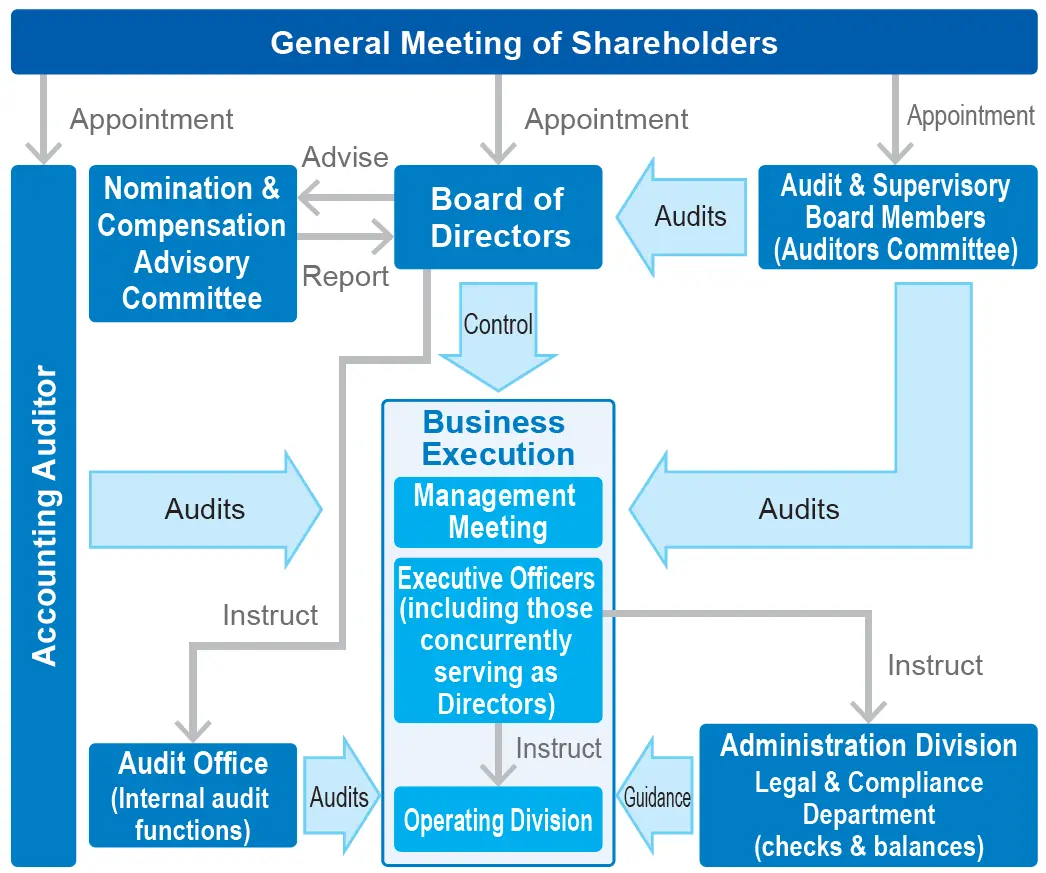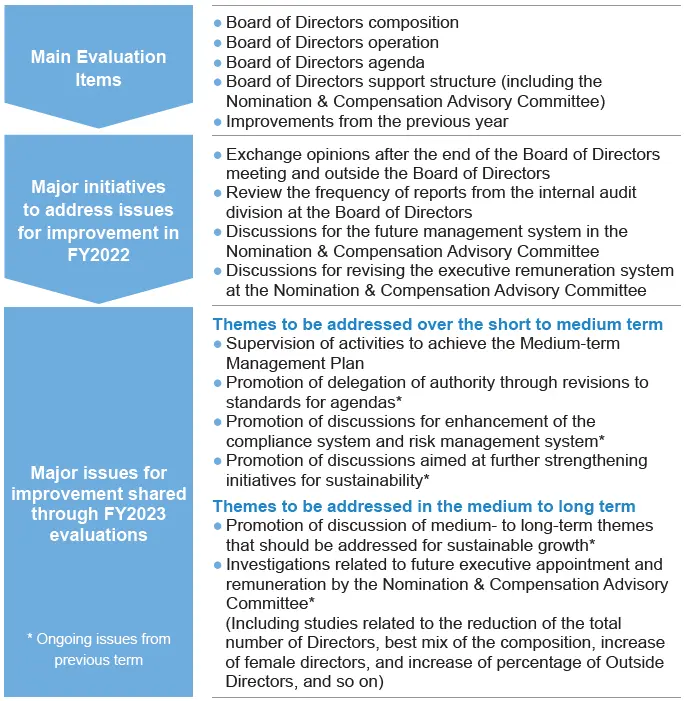Corporate Governance
- Fundamental concepts and system
- Corporate governance system
- Details are noted in the Corporate Governance Report, which is available at our website or the Tokyo Stock Exchange website.
- Major changes in strengthening of Corporate Governance
- Improvement of the effectiveness of internal controls
- Evaluation of the effectiveness of the Board of Directors
- Nomination and Compensation Committee
- Support system for Outside Officers
- Board of Directors Skills Matrix
- Directors’ compensation and selection of Outside Executives
- Kumagai Gumi Group Tax Policy
Fundamental concepts and system
In order to make our Management Philosophy of "We aim to serve as a corporate group that contributes to society through business activities centered on construction" a reality, we consider enhancement of the efficacy of our corporate governance a priority issue.
Kumagai Gumi Corporate Governance ReportLast Updated: December 24, 2024
Corporate governance system
Drawing on the aims of the Corporate Governance Code, Kumagai Gumi has adopted a corporate governance structure that comprises a Board of Directors, a Board of Corporate Auditors, and an independent accounting auditor to enhance the effectiveness of our corporate governance.
To achieve clarity in management responsibilities and to build an optimal management system in response to changes in the business environment, the term of office of Directors is set to one year. We also appoint three Outside Directors who provide counsel to management from an objective standpoint.
The nomination of Directors and Executive Officers and amounts of compensation are determined by the Board of Directors on the basis of reports by the Nomination & Compensation Advisory Committee, composed of the President and Representative Director and Outside Directors, to ensure objectivity and transparency.
With regard to Audit & Supervisory Board Members, we appoint Outside Audit & Supervisory Board Members from among persons who have appropriate experience and capabilities and who have knowledge of finances, accounting, and legal matters, in order to conduct audits with high efficacy.
Regarding accounting audits under the Companies Act and the Financial Instruments and Exchange Act, we undergo impartial audits by GYOSEI & CO.
Details are noted in the Corporate Governance Report, which is available at our website or the Tokyo Stock Exchange website.

Major changes in strengthening of Corporate Governance

Improvement of the effectiveness of internal controls
Kumagai Gumi reviews internal rules and management conferences appropriately, and otherwise improves and operates structures to assure appropriateness in work, based on our Basic Policy to Establish Internal Control Systems.
In addition, the Kumagai Gumi Group as a whole undertakes the improvement and operation of internal control with the aim of maintaining the reliability of our financial reporting, based on the Financial Instruments and Exchange Act.
Evaluation of the effectiveness of the Board of Directors
Once a year, Kumagai Gumi Directors and Audit & Supervisory Board take part in an anonymous questionnaire survey evaluating the effectiveness of the Board of Directors. The Board of Directors verifies the results of the survey and considers improvements. From the FY2018 evaluation onward, we are conducting reviews of our evaluation item settings and evaluation results through external experts.
In FY2021, we conducted the following self-evaluations, and based on the findings of the reviews by outside experts, we confirmed that the Board as a whole is appropriately carrying out its role and responsibilities, and we determined that the efficacy of the Board of Directors overall is secured.
Based on the issues for improvement shared as a result of the FY2020 evaluation, we implemented improvement measures, and also worked to invigorate discussions at the Board of Directors meetings by holding exchanges of opinions after the meeting's proceedings and other occasions. In order to further enhance the effectiveness of the Board of Directors, we will continue to work toward constructive and active expression of opinions and highly effective supervision of business execution, taking into account the issues for improvement shared through the evaluation in FY2021.

Nomination and Compensation Committee
Concerning the procedures for determining the nomination (including dismissals) and amounts of compensation (including system design) for Directors and Executive Officers, the Nomination and Compensation Committee (which performs the functions of both the Nomination Committee and the Compensation Committee), consisting of the President and Representative Director and Outside Directors, has been established as a consultative body to the Board of Directors.
In FY2021, the Nomination and Compensation Committee met eight times, with all members in attendance at each meeting. In
FY2021, we are considering the evaluation of the performance of Directors and Executive Officers in terms of their contributions to the FY2020 business results, the individual remuneration amounts for FY2021, and the executive structure for FY2022 and beyond.
Support system for Outside Officers
We have a system in place that facilitates understanding of our business activities to ensure the smooth execution of duties by Outside Directors and Outside Officers. The Secretarial Department of the Management Strategy Office and the Corporate Planning Department play a central role in providing materials for Board of Directors meetings and advance explanations of agenda items to Outside Directors. They also hold meetings to exchange opinions among Outside Directors, and inspect branch offices and construction sites.
Board of Directors Skills Matrix
Toward realizing our long-term Vision and achieving our Medium-term Management Plan goals, we have defined the following as the skills required for the Board of Directors, which will play a central role in this effort:
- Corporate management / strategy,
- Sales / marketing,
- Global operations,
- Technology / R&D / ICT (DX),
- Compliance / risk management,
- finance/accounting,
- Sustainability (ESG/SDGs), and
- Human resources development / diversity.
In appointing each Director, Kumagai Gumi takes into account each Director's duties and experience, while paying attention to ensure that the skill items required by the Board of Directors are appropriately allocated and that diversity and balance are maintained on the Board of Directors.
The following is a list of skill items that the Board of Directors should have and that are specifically expected of each Director (Skills Matrix).
Directors’ compensation and selection of Outside Executives
Compensation for Directors is based on a system of compensation linked to shareholder interests, functioning appropriately as an incentive to continuously improve corporate value. When determining individual compensation, our basic policy is to set an appropriate level based on the responsibility of the individuals, and, within the limit of the total amount of compensation for Directors decided at General Meetings of Shareholders, determine amounts through the Board of Directors based on findings reported by the Nomination & Compensation Advisory Committee.
Specific compensation for Directors consists of monetary compensation (fixed compensation and bonuses) and stock compensation. For Outside Directors who bear supervisory functions, it consists of only monetary compensation (of fixed compensation, an amount of compensation according to position). The fixed compensation is monthly monetary compensation, and consists of compensation according to position and compensation according to contribution to business performance. In addition, the company has adopted a stock compensation system employing trusts, by which the company grants points based on position, etc. each fiscal year to eligible persons, and, generally at the time of retirement, grants shares of stock based on the cumulative number of points.
Compensation for Audit & Supervisory Board Members is determined through deliberation by Audit & Supervisory Board Members, within the limit of the total amount of compensation for Audit & Supervisory Board Members decided at General Meetings of Shareholders.
Kumagai Gumi Group Tax Policy
The Kumagai Gumi Group recognizes that it is an important obligation for companies to fully understand the social significance of tax payment and properly fulfill their tax obligations in each country and region.
-
Compliance with Laws and Regulations
The Kumagai Gumi Group fulfills its tax return and tax payment obligations in compliance with tax laws, regulations, and conventions of each country and region.
-
Optimization of Tax Expenses
The Kumagai Gumi Group will conduct tax planning, including the utilization of preferential tax systems, within the scope of normal business activities, in order to optimize tax expenses. It should be noted that we will not take any action to reduce the tax burden unreasonably, which is not in line with the spirit of laws and regulations.
-
To Reduce Tax Risk
The Kumagai Gumi Group shall endeavor to reduce tax risks by seeking agreement with the tax authorities through advance inquiries and other means regarding matters that are unclear in terms of tax matters.
-
Relationship with Tax Authorities
The Kumagai Gumi Group will provide information in a timely and appropriate manner in response to requests from tax authorities in each country and region, and build relationships of trust with and favorable cooperative relations with tax authorities through constructive dialogue.
